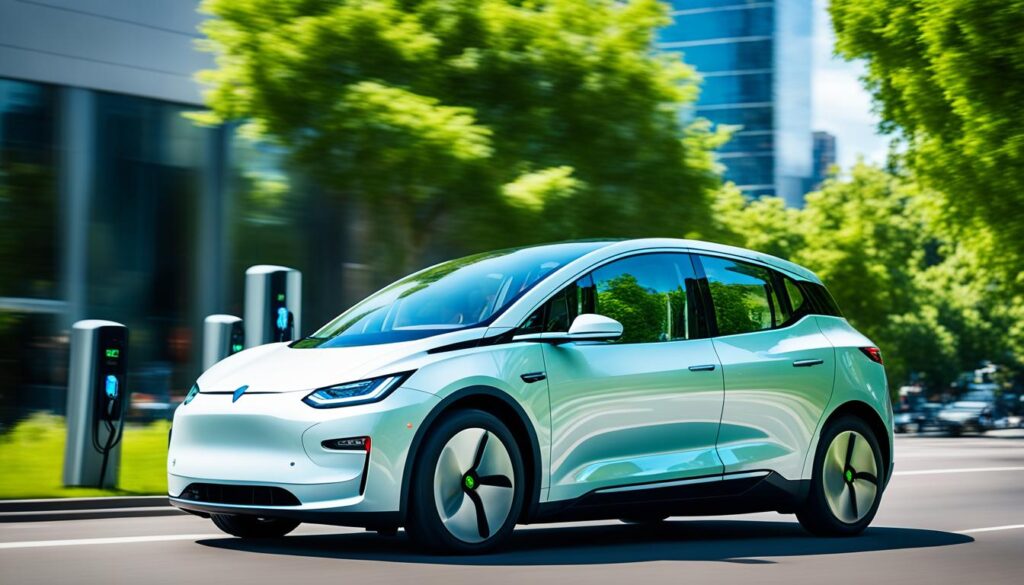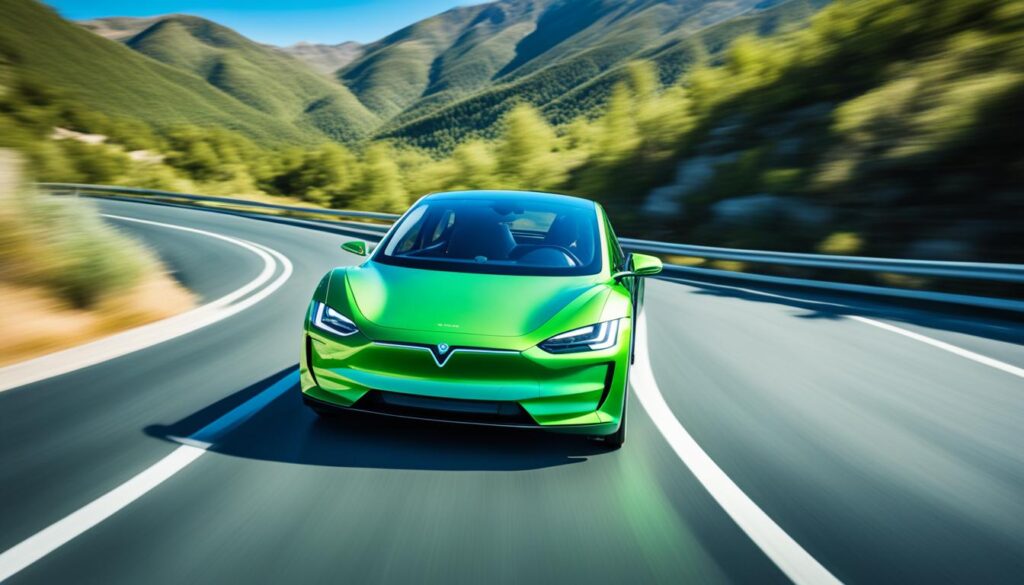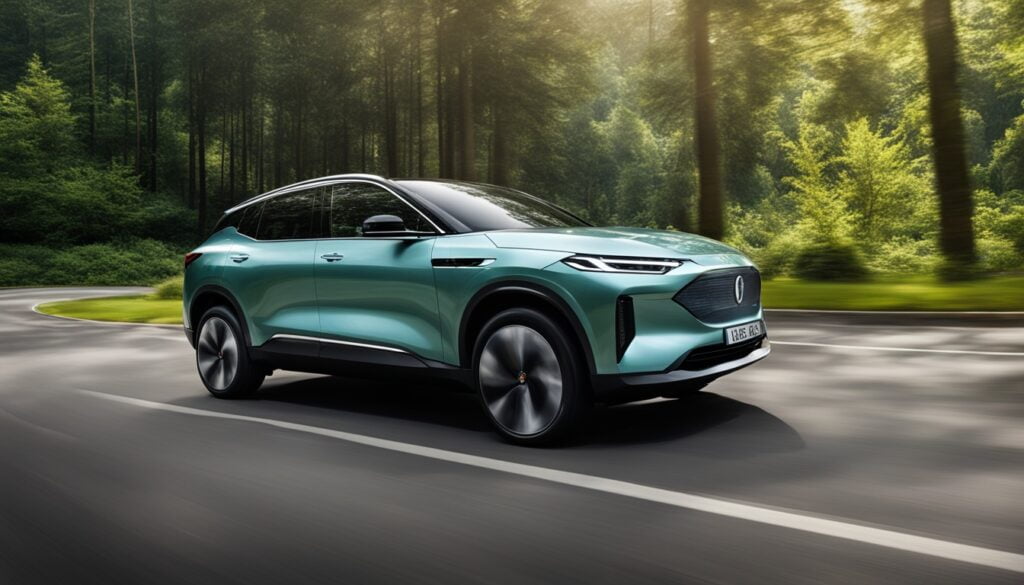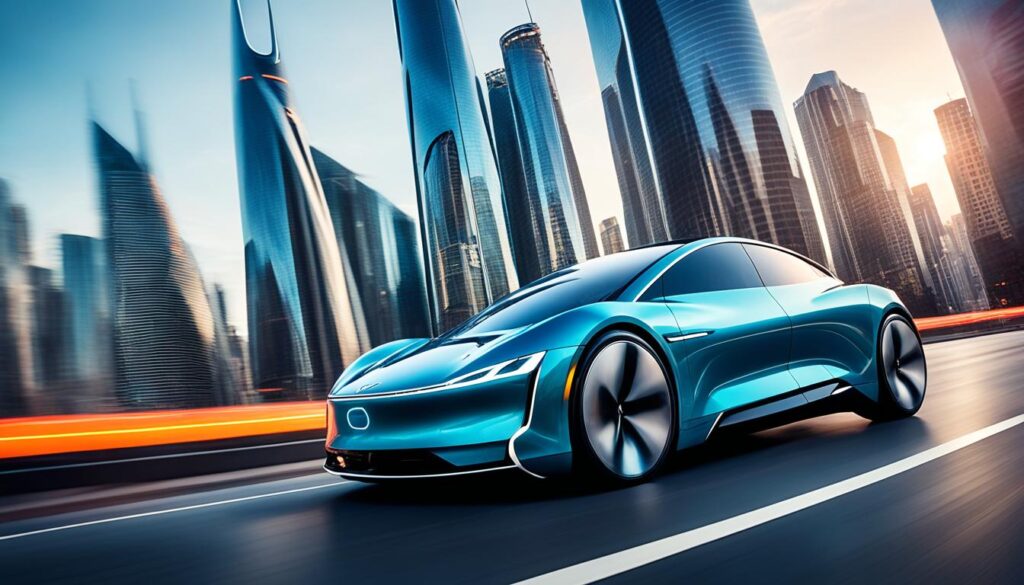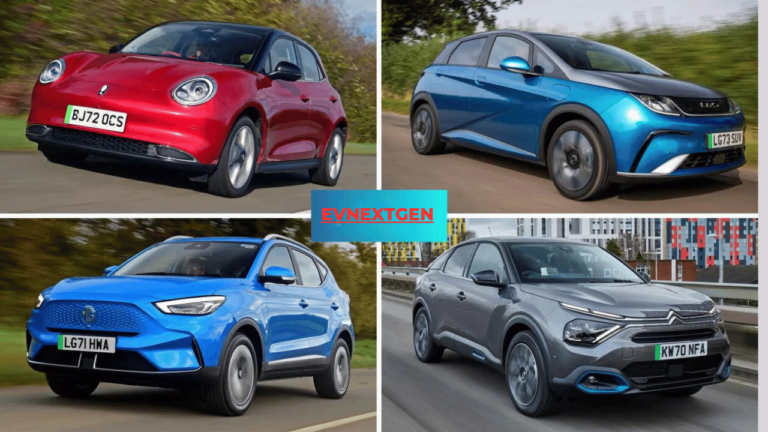Looking for the best electric car means more than just checking emissions. It’s about the whole life cycle, from making the car to recycling it. Cars like the Nissan Leaf are great examples of eco-friendly cars. They are made efficiently and don’t harm the air when you drive them.
Now, with more electric car reviews and data on top electric vehicles, it’s easier to see their benefits. This makes choosing an electric car a smart move for those in places like Singapore. There, electric cars are supported by government incentives, making them a smart financial choice.
Models like the BMW i3 and the Kia Soul EV show the variety of electric cars available. From the luxury Tesla Model S to the practical Hyundai IONIQ EV, there’s something for everyone. These cars are great because they save money and need little maintenance. They also show how the world is moving towards sustainable transport.
For more info and opinions on this changing industry, check out EV Next Gen.
Key Takeaways
- The Nissan Leaf leads as an example of full life cycle eco-friendliness in electric cars.
- Singapore’s electric vehicle sector is growing due to substantial government incentives.
- Vehicles like the Tesla Model S and Hyundai IONIQ EV showcase the diversity in electric cars catering to luxury and practicality.
- Cost-effectiveness and lower maintenance needs are significant advantages of owning an electric vehicle.
- Extensive electric car reviews and comparisons are available on platforms like EV Next Gen to aid buyers in making informed decisions.
Understanding the Life Cycle of an Electric Car
The electric car life cycle is getting more attention for its innovative transport and its promise to cut down on the environmental impact of cars. It starts with getting the raw materials and ends with recycling the car. The Nissan Leaf is a key example, known for its zero tailpipe emissions and eco-friendly production. It’s a big player in the electric vehicle market.
Assessing Full Car Life Cycle Impact
Studies show electric vehicles (EVs) have a much smaller carbon footprint than cars with internal combustion engines (ICE). EVs produce about 39 tonnes of CO2 over their life, which is less than ICE vehicles at 55 tonnes. This shows a big change needed in the car industry for sustainability.
The Nissan Leaf’s Environmental Approach
The Nissan Leaf is unique in its approach to sustainability. It starts with using sustainable materials and makes energy-efficient cars. It also plans for recycling at the end of its life, aiming for a full circle of sustainability.
Tools for Analyzing Life Cycle Carbon Footprint
Tools like Green NCAP’s Life-Cycle Assessment tool are key to understanding and improving the electric car life cycle. They give detailed insights on each stage of an EV’s life. This helps buyers and makers choose greener options in the electric vehicle market.
Switching to electric cars is a big step towards reducing the environmental impact of cars. As battery technology gets better and energy sources become greener, electric vehicles will get even cleaner. This makes them a key part of a sustainable car future.
Electric Car Features that Drive Sustainability
The shift to electric cars is changing the auto industry. It’s all about using less energy and protecting the environment. This change is a big step towards a more sustainable future for transportation.
Measuring Miles per Gallon Equivalent (MPGe)
MPGe is a key way to measure how efficient electric cars are. It lets us compare electric and gas cars fairly. Now, electric cars can go over 130 MPGe, beating traditional cars in energy use.
Innovative Technologies in Electric Models
Electric cars are getting better all the time. With over 10 million on the road, they’re getting more efficient and lasting longer. Manufacturers are confident in their batteries, offering up to 8 years or 100,000 miles of use.
Importance of Efficiency and Design
Electric cars look good and are good for the planet. They’re designed to use less energy and weigh less. This helps them move without harming the environment.
| Statistic | Data |
|---|---|
| U.S. net exporter of petroleum status | Became net exporter in 2020 |
| Transportation sector energy needs (U.S.) | 30% of total U.S. energy |
| Typical EV energy consumption | 25-40 kWh per 100 miles |
| Number of U.S. charging stations (2023) | Over 53,000 stations |
| Forecast for global new car sales, all-electric by 2030 | 52% |
Electric cars are a big step towards cleaner transport. They’re supported by policies and incentives to encourage more people to switch. This is part of a global effort to cut down on carbon emissions.
Best Electric Car Performance and Accessibility
The search for green solutions is growing, and top-rated electric cars are leading the way. They’re boosting electric car performance and making accessibility in electric vehicles better. These cars are powerful and easy to use, with lots of electric car charging stations available.
| Vehicle Type | Average Starting Cost | Average Range (miles) | Average Fuel Economy (MPGe) | Average Acceleration (0-60 mph) |
|---|---|---|---|---|
| Electric SUVs | $50,793 | 292 | 101 | 4.8 seconds |
| Electric Sedans | $49,364 | 315 | 127 | 5.5 seconds |
| Electric Pickup Trucks | $59,925 | 299 | 68 | 3.2 seconds |
These numbers show how advanced electric car performance is. They also highlight big steps in making electric vehicles more accessible. For example, the long ranges are great for long trips, giving drivers lots of room to go before charging again. Plus, new tech has made electric car charging stations faster, cutting down on waiting time.
More people are choosing electric cars thanks to things like a federal tax credit. This credit can be up to $7,500, making these cars more affordable. Whether you want something practical like the Nissan Leaf or something fancy like the BMW iX, there’s an electric car for everyone.
In short, top-rated electric cars are a great pick for those looking for green and efficient cars. They offer great performance, are good for your wallet, and are easy to use. With lots of electric car charging stations around, owning an electric car is practical and convenient. This marks a big step forward for the car industry.
Diving into Electric SUVs and Family Cars
The electric vehicle market is booming, with electric SUVs and family cars leading the way. These vehicles offer both eco-friendly options and lots of space. Models like the Tesla Model Y and the Volkswagen ID.4 are perfect for families who care about the planet.
State of SUVs in the Electric Vehicle Market
Electric SUVs are now big in the electric vehicle market. The Tesla Model Y can go up to 326 miles on a single charge, great for long trips. The Volkswagen ID.4 is ideal for families, with lots of room for cargo and comfy seats for city driving or longer trips.
These cars come with safety features like lane departure warnings and blind-spot monitoring. This makes them safe and eco-friendly for everyone inside.
Family-oriented Features in Electric Cars
Family electric cars focus on space, ease of use, safety, and fun for everyone. Foldable rear seats in many electric SUVs and minivans give you flexible space for different needs. Cars like the Nissan Leaf Plus come with ProPILOT Assist for smoother and safer drives.
There are more charging stations popping up, making electric cars more practical than ever. Plus, government incentives and rebates make them a smart buy. You’ll save money and help the environment too.
Premium Electric Car Brands and High-Tech Cars
The car industry has changed a lot with the rise of premium electric car brands. These brands offer eco-friendly cars that are also luxurious and full of the latest technology. They’re leading the way with luxury electric models that are fast, green, and packed with new tech.
Luxury Electric Models on the Market
The 2024 BMW i7 xDrive is a top pick for luxury lovers, with a 603 miles range. It costs $125,195. The Mercedes-Benz Vision EQXX is also a standout, offering up to 745 miles on a single charge. These cars show how luxury and efficiency can come together in electric vehicles.
Technology Integration for Enhanced Driving Experience
High-tech electric cars are more than just electric; they’re packed with features that make driving better. The Tesla Model Y Long Range AWD has a 330 miles range and advanced tech for driving on its own. The Polestar 5, coming in 2024, will have two electric motors, showing how electric car tech is always getting better.
Ethical Sourcing and Recycling in Premium Brands
Premium electric car brands are focusing on ethical sourcing and recycling to reduce harm to the environment. The Lucid Air and Genesis X Concept use big batteries for long range and are made with sustainable materials. This shows the industry’s move towards making electric cars better for the planet.
As more people want luxury electric cars and high-tech electric cars, premium brands are key to a sustainable future. They’re using ethical practices and the latest tech to make driving greener and more comfortable. This is changing what luxury and tech in cars mean.
Electric Car Pricing: From Affordable to Luxury Options
The demand for electric vehicles (EVs) is growing fast. This means there are now many electric car pricing options available. It’s important to know the difference between affordable electric cars and luxury electric cars. This helps you make a choice that fits your budget and needs.
Affordable electric cars are becoming more popular as they become more affordable. For example, the Volkswagen ID.4 and Chevrolet Equinox EV are great choices. They come with a full $7,500 tax credit, making them more affordable. The Nissan Leaf also starts at $28,140 and can save you money with tax credits.
| Model | Starting Price | Range (miles) | Tax Credit |
|---|---|---|---|
| Volkswagen ID.4 | $39,735 | 206-291 | $7,500 |
| Chevrolet Equinox EV | $30,000 (est.) | 250-300 (est.) | $7,500 |
| Nissan Leaf | $28,140 | 149-212 | $3,750 |
| Mini Cooper SE | $30,900 | 114 | None |
| Hyundai Kona Electric | $32,675 | 200-261 | $7,500 (est.) |
Luxury electric cars also offer cutting-edge technology and performance. Models like the Tesla Model S and Lucid Air are high-end choices. They are not just cars but also a statement about living sustainably and in luxury.
Whether you choose an affordable electric car or a luxury electric car, electric vehicles are becoming a big part of the car world. The cost of owning an EV is getting better over time. They cost less to run and maintain than cars with gas engines.
So, there’s a car for everyone, whether you want something affordable or luxury. Each car has its own set of benefits. This means you can find an electric car that matches your style, how you use it, and your budget.
Upcoming Electric Cars to Watch
The electric vehicle market is buzzing with electric car announcements. These promises aim to change how we drive towards a sustainable future. Brands like Audi, Cadillac, BYD, and Polestar are bringing upcoming electric models to the table. Car buyers and fans have a lot to look forward to.
Manufacturers are focusing on future electric vehicle technology. They’re improving vehicle performance and increasing range and efficiency. This is setting the stage for an exciting future for the newest electric cars.
| Model | Expected Release | Price Range (USD) | Range (miles) | Horsepower |
|---|---|---|---|---|
| Audi A6 E-Tron | 2025 | $82,000 – $108,000 | 400 | 469 |
| Cadillac Celestiq | 2024 | $200,000+ | 300 | 600 |
| BYD SEAL U | 2024 | $40,000 – $46,000 | 261 – 311 | TBD |
| Honda Prologue | 2024 | $45,000 – $60,000 | 300+ | TBD |
These models show big steps in electric car design. They set new standards for electric car technology. The luxury segment is getting a boost with models like the Audi A6 E-Tron and Cadillac Celestiq. They offer elegance with great power and range.
As technology gets better and market needs change, the future looks bright for electric vehicles. With each new model, manufacturers are moving towards better energy efficiency, performance, and sustainability. This makes the future very promising for the industry and its customers.
Eco-Friendly Electric Cars: Innovations and Developments
The electric vehicle (EV) market is changing fast, thanks to new technology and more people caring about the planet. Electric car innovations and sustainable electric car production are making eco-friendly electric cars a key part of car technology.
More money is going into this field, with governments and companies working to improve electric car developments. For example, in 2020, governments spent $14 billion on incentives for buying electric cars. This shows how important it is to have greener transport options.
Advancements in Electric Car Technology
New tech has made electric car innovations a top area in car engineering. Cars like the Rimac Nevera are super fast, going from 0 to 60 mph in just 1.85 seconds. They also have the latest features for better efficiency and safety.
Autonomous driving tech is getting better, thanks to companies like Tesla. This makes roads safer and cuts down on human mistakes. Also, fast charging tech lets EVs charge up to 80% in just minutes, making them more practical for daily use.
Manufacturers are also focusing on making production more sustainable. They’re building big factories called “gigafactories” to meet the growing demand. These factories follow eco-friendly electric car production standards.
Eco-Friendly Materials and Manufacturing in EVs
Companies are looking at the whole picture, not just emissions from the car. They’re using eco-friendly materials in their cars. Brands like Fisker and Lexus are using materials that are good for the planet and ethically sourced.
New battery tech, like solid-state and lithium-sulfur batteries, promises better efficiency and longer life. This is key for electric car developments. Recycling tech is also getting better, aiming to recover and reuse up to 95% of battery materials. This shows the industry’s dedication to being sustainable.
For more on electric car innovations, it’s clear that the path to sustainable transport needs strong investment, innovation, and a new look at how we make cars.
Best Electric Cars Available in Market Segments
The electric car market is growing fast, offering a wide range of top electric cars for different needs. Finding the best electric options can be tough, so comparing them is key. Let’s look at some top models in various segments:
Family SUVs and big utility vehicles are getting more popular. The Chevrolet Equinox EV is a great choice for families. It has a range of 250 to 300 miles and up to 290 horsepower in all-wheel drive. On the other hand, the Rivian R1T electric truck offers a huge 420-mile range, perfect for rugged use.
Sporty sedans like the BMW i4 are also making waves. They look good and drive well, offering a fun experience without harming the environment. The Kia EV6 is another standout, known for its design and efficiency.
| Model | Power (hp) | Range (miles) | Starting Price ($) |
|---|---|---|---|
| Audi Q6 E-Tron | 422 | 300+ | Not Listed |
| Chevrolet Silverado EV | Not Specified | 450 | 72,905 – 94,500 |
| DeLorean Alpha5 | Not Specified | Not Listed | 150,000+ |
| Tesla Model Y | Not Specified | 330 | Not Listed |
| Lucid Air | Not Specified | 516 | 71,400 |
The electric car market segments offer a wide range of choices. Whether you want a car for long trips, lots of power, or a good price, there’s something for everyone. The market is full of options that meet different needs and tastes.
Making the Eco-Friendly Choice: Electric Car Buying Guide for Consumers
Choosing an eco-friendly vehicle is more important than ever, thanks to growing environmental concerns. This guide helps you pick electric vehicles, compare models, and see how electric cars save money.
Selecting the Right Electric Vehicle for Your Needs
When picking an electric vehicle, think about your lifestyle and driving habits. Consider the range, charging times, and charging station access, especially if you live in a less serviced area. Maintenance costs are often lower because electric cars have fewer parts.
It’s also key to look at the vehicle’s efficiency. The Green NCAP’s Life-Cycle Assessment ratings help you see how different electric cars affect the environment.
Cost-Effectiveness of Electric Cars Over Time
Electric vehicles save money over time. They cost more to buy but fueling them is cheaper, about $700 a year in Australia. This is less than the $4000 a year for petrol cars. Plus, you might get rebates and lower stamp duty, making them cheaper to own.
Think about how much a car will depreciate, like the BMW i3. This affects the car’s value over time.
Comparing Electric Vehicle Models and Features
There’s a wide range of electric vehicles, each with unique features for different needs. From fully electric to hybrids, picking the right one is crucial. For example, hybrids like the Toyota Prius and Honda Civic Hybrid use less fuel and emit fewer pollutants than non-hybrid cars.
- Fully Electric Vehicles: These cars have no exhaust emissions and are great for city driving and short trips.
- Hybrid Vehicles: These cars use both petrol and electric power. They’re good for short trips and don’t need frequent recharging.
| Car Model | Greenhouse Gas Rating | Vehicle Type |
|---|---|---|
| Prius | 9/10 | Hybrid |
| Civic Hybrid | 8.5/10 | Hybrid |
| Civic | 7/10 | Non-Hybrid |
| Camry | 6.5/10 | Non-Hybrid |
In conclusion, electric vehicles offer many options, features, and savings. By carefully looking at these, you can make a smart choice that’s good for the planet and your wallet.
Conclusion
The journey through electric vehicles (EVs) shows a wide range of best electric car choices. These cars are great for daily commutes and family trips. They are more efficient than traditional cars, using up to 62% of the electrical energy from the grid.
However, EVs come with new challenges like charging time and energy losses. These losses happen during power generation, transmission, and distribution. We must think about these when choosing eco-friendly options.
Some EV models can go up to 120 miles on a single charge. But, recharging can take a long time, up to 80 hours with some chargers. This can also put a strain on power grids. Still, cars like the Nissan Leaf show how we can make EVs better for the planet.
Looking at final thoughts on electric vehicles, we see a big change coming in the car world. It’s full of challenges but also lots of potential. For those looking to go green, EVs offer many good options.
Thanks to technology and better infrastructure, EVs are leading us toward a cleaner future. They are a key part of our effort to make the planet more sustainable.


